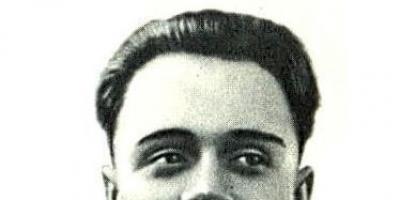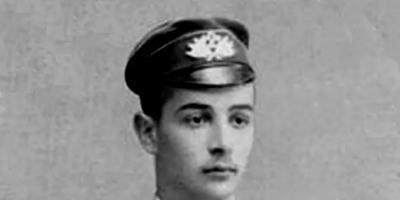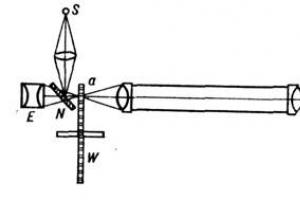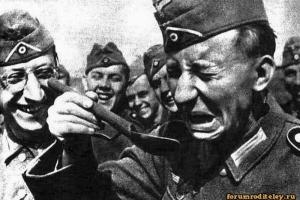(1880 - 1932)
Black Sasha real name - Alexander Mikhailovich Glikberg (1880 - 1932), poet.
Born on October 1 (13 NS) in Odessa in the family of a pharmacist. He studied at the St. Petersburg gymnasium, from which he was expelled for poor academic performance. Served at customs.
The first poems were published in 1904 in Zhitomir. In 1905 he moved to St. Petersburg, where he collaborated in the progressive satirical magazines “Spectator”, “Hammer”, “Masks”, etc.
He first signed the pseudonym "Sasha Cherny" in 1905 under the political satire "Nonsense", which brought him fame and served as the reason for the closure of the magazine "Spectator". The first collection of poems, “Different Motives,” which contained political satires along with lyrics, was banned by censorship.
In 1906 - 1907 he lived in Germany, attended lectures at the University of Heidelberg. Returning to St. Petersburg, for three years (1908 - 11) he collaborated with Satyricon (a magazine of satire and humor), became a leading author, and gained all-Russian fame. “Having received the latest issue of the magazine, the reader first of all looked for the poems of Sasha Cherny in it. There was no student, student, doctor, lawyer... who did not know them by heart” (K. Chukovsky).
After leaving Satyricon, he wrote for various newspapers and magazines, wrote several children's books ("Knock Knock", 1913; "Living ABC", 1914), and was engaged in translations.
After the revolution he went to Vilna, where he wrote a series of poems for children. In 1920, he emigrated abroad from Kovno, lived in Germany, releasing his third book of poems, “Thirst” (1923). He acted mainly as a children's writer.
In recent years, prose occupied a large place in his work ("Soldier's Tales", published in 1933; "Frivolous Stories", 1928).
Sasha Cherny died in France, in the town of Lavender, on July 5, 1932.
Brief biography from the book: Russian writers and poets. Brief biographical dictionary. Moscow, 2000.
Currently watching:
I agree that love is stronger than death. Love is a pure, real feeling that you can only dream about. This feeling is unexpected: you cannot love a person for something. You love him because he simply is. real feelings are stronger than distance and obstacles. And only death can put an end to it. But even after death, this feeling continues to live in the soul and heart of the second lover. No one knows exactly what love is or how it arises. Some people don't believe in it at all. But I think
A.P. PlatonovPit“On the day of the thirtieth anniversary of his personal life, Voshchev was given a settlement from a small mechanical plant, where he obtained funds for his existence. In the dismissal document they wrote to him that he was being removed from production due to an increase in weakness and thoughtfulness in him amid the general pace of work.” Voshchev goes to another city. In a vacant lot in a warm pit, he settles down for the night. At midnight he is awakened by a man mowing grass in a vacant lot. Kosar says that construction will begin here soon.
The novel “Crime and Punishment” was conceived by F. M. Dostoevsky during his stay in hard labor. Then it was called “Drunk People,” but gradually the concept of the novel transformed into “a psychological report of a crime.” Dostoevsky himself, in a letter to the publisher M.I. Katkov, clearly retells the plot of the future work: “A young man, expelled from the university students and living in extreme poverty... having succumbed to some strange unfinished ideas... decided to get out of the bad life at once.
The main character of the novel “Crime and Punishment” is Rodion Romanovich Raskolnikov. This is an impoverished nobleman who came to St. Petersburg to study. He had practically no money to live on. The only support is money from home, from my mother and sister. The mother allocated as much as she could from her meager pension, and the sister, in order to help Raskolnikov, got a job in a rich house. Sometimes he himself managed to earn some money by teaching some lessons. Raskolnikov is not alone in his plight
The first time he visited here was back in 1827, arriving during the spring holidays with N. G. Belousovsh, a professor at the Nizhyn Gymnasium of Higher Sciences. He stayed in Podol with V. M. Belozersky. The city captivated the imagination of young Gogol, delighting with its nature and ancient monuments. The spring Dnieper especially captivated the 18-year-old boy. Apparently, from this first visit, Kyiv became Gogol’s dream, the city of his hopes, with which he mentally connected his future life. Gogol's love for Kyiv was united
The novel “The Master and Margarita” provides a deep, psychologically accurate analysis of the hero’s behavior, which develops into a moral trial of Pilate. This is a complex, dramatic figure. He is smart, not alien to thoughts, human feelings, living compassion. While Yeshua preaches that all people are good, the curator is inclined to look condescendingly at this harmless eccentricity. But now the conversation turns to supreme power, and Pilate is pierced by acute fear. He is still trying to bargain with his conscience, trying to persuade Yeshua to compromise
The pinnacle of the work of the Russian poet N. A. Nekrasov becomes the epic poem “Who Lives Well in Rus',” in which the author, with vivid imagery and authenticity, wanted to show and showed the relationship between the ruling class and the peasantry in the 20-70s of the 19th century. Already at the beginning of the work, the author poses a problem that will find its solution on the pages of the poem: what does happiness consist of and who is truly happy? "Who lives happily and freely in Rus'?" Note that the first candidate for the
Having lived just over half a century, this writer, poet, and journalist managed to leave a bright mark on Russian literature. Children know Sasha Cherny as the “parent” of the world’s most popular fox terrier named Mickey, the author of many poems and stories. And adults value him not only for his works that bring him back to childhood, but also for the caustic satire that permeates most of the writer’s works.
Childhood and youth
At the end of the 19th century, an ordinary Jewish family lived on Rishelievskaya Street in Odessa: pharmacist Mendel Glikberg, his wife Maryam, sickly and suffering from hysteria, and five children. The boy born into this family on October 1 (13), 1880, received the name Alexander. Sasha's childhood was joyless. His father, an agent for a pharmaceutical company, was constantly on the move. Due to the state of health of the children, the mother practically did not take care of the children, but she complained about them to her husband. And he was quick to punish, so the children did not like and were afraid of his visits home.
In 1887, Russia adopted a rule according to which Jews could not make up more than 10 percent of gymnasium students. Pharmacist Glikberg found a way out - he baptized the family. So at the age of nine, Alexander entered the gymnasium. Studying, which came quite easily to the boy, was hampered by the difficult atmosphere in the family, and at the age of 15 Sasha ran away from home.
My aunt, my father’s sister, moved my nephew to St. Petersburg, to the gymnasium, on full board. At the St. Petersburg gymnasium, Alexander had a more difficult time - he could not cope with the algebra program and flew out of the educational institution.
 Sasha Cherny in his youth
Sasha Cherny in his youth The parents were not eager to provide financial support to the prodigal son. The guy had to beg, but his impoverished existence did not last long. Fate, in the person of the aspiring journalist Alexander Yablonovsky, smiled on the future poet. He published an article about the poor young man in the newspaper “Son of the Fatherland,” and the tragic story was read by Konstantin Roche, a Zhytomyr official, poet, and philanthropist.
Roche took Alexander Glikberg to Zhitomir and enrolled him in a gymnasium, where, however, the guy also did not finish his studies due to a quarrel with the director. Moreover, after expulsion, the future poet received a “wolf ticket” - he was forever deprived of the right to admission.
 Sasha Cherny in the army
Sasha Cherny in the army At that time, Alexander was already 20 years old. The guy replaced the gymnasium with the army, where he served as a volunteer for two years. For another year he worked at customs in Novoselitsy, on the border with Austria-Hungary. In 1904, the Volynsky Vestnik newspaper published “The Diary of a Reasoner,” the writer’s first work. And soon Alexander Glikberg joined the newspaper’s editorial staff as a feuilletonist. Alas, after a couple of months the newspaper ceased to exist, and the future Sasha Cherny moved to St. Petersburg
Literature
Russian literature is rich in “talking” pseudonyms like Demyan Bedny, Emil Krotky. The pseudonym Sasha Cherny has a different origin. Alexander Glikberg had different pseudonyms - On his own, Heine from Zhitomir, etc. And the name by which readers now know the poet and writer comes from childhood: this is how the little brunette Sasha was called by his relatives in order to distinguish him from the other Sasha Glikberg, the blond.

The first poem, signed by Sasha Cherny, was published in 1905 and “exploded” the reading public. Under the title “Nonsense” was hidden a biting satire on the very top of the then government: State Duma deputies, ministers and even the Tsar. The magazine “Spectator” was immediately closed after this. And Sasha Cherny took off on a wave of popularity, his poems were published in the satirical magazines “Hammer”, “Almanac”, “Masks”.
In 1906, the first collection of poems by Sasha Cherny was published, but due to works of a political nature, the circulation was seized. The author escaped arrest by leaving for Germany, where he attended lectures at the University of Heidelberg as a volunteer.

Sasha Cherny returned to St. Petersburg in 1908. For three years he systematically published the works of the young author in the magazine Satyricon, under whose auspices the best humorists of that time worked. Over the years, the talent of the bright poet of the Silver Age blossomed, Sasha Cherny’s books were actively published, poems were published in Sovremennik, Solntse Rossii, Odessa News and others, and only praise was heard from critics. But, having achieved success, Sasha remained the same closed Jewish boy.
In 1912, having left for Capri, Sasha Cherny became friends with Maxim Gorky and tried to write prose. The First World War began, and Alexander was sent as an orderly to a hospital in St. Petersburg, but then transferred to a field hospital. During the war, Sasha the poet could not create; he even had to be treated for severe depression. But Sasha the prose writer was actively working, writing and publishing books for children.

Sasha Cherny easily opens up a whole world for children. This is the peculiarity of his work - a touching love for children and at the same time the ability to stand on the same level with a child and conduct a surprisingly adult conversation with him. For him, children are both readers and heroes of works, for example, the stories “Prisoner of the Caucasus” or “The House in the Garden.”
Another feature is the combination in adult poems of merciless satire, stunning sincerity, heartache and eternal notes of pessimism. And yet the poems have very different directions. For example, “Galchata” is light and airy, “Orange” breathes lyricism, albeit with a touch of irony. And “Hyena” seems like a miniature for children, but the conclusion that the author draws clearly appeals to the adult mind.

In 1918, Sasha Cherny, who did not accept Bolshevik power, chose life in exile. The emigrant's biography includes Lithuania, Germany, Italy, France. The writer published in newspapers and magazines, hosted literary evenings, and performed poetry. Then “Frivolous Stories”, “Professor Patrashkin’s Dream”, “Fox Mickey’s Diary”, “Ruddy Book” appeared. After the author’s death, “The Sailor Squirrel” and “Soldier’s Tales” appeared before the reader.
Sasha Cherny has written more than 40 books and collections, about 100 quotes that have become aphorisms, many poems, as well as translations by Knut Hamsun, Richard Demel and others. The composer created a number of musical works based on the poems of Sasha Cherny.
Personal life
Sasha Cherny got married once and for all. His chosen one was Maria Vasilyeva, his boss at the time when the poet worked in the Collection Service of the Warsaw Railway. The woman was several years older, but neither this nor the difference in education and position prevented Sasha and Marina from starting a friendship, which later grew into marriage.

In 1905, Alexander, having married, found a reliable rear. Maria Ivanovna surrounded her husband with care and relieved him of everyday problems. They lived their entire lives in peace and harmony; the couple had no children.
In the late 1920s, Sasha Cherny built a house in the south of France, in the Russian colony of La Favière. There, in Provence, he lived until his death.
Death
The poet and writer died on August 5, 1932. Alexander was helping to put out a fire at his neighbors’ house, but he was worried and tired. Returning home, he lay down on his bed and never got up again - his life was interrupted by a heart attack.

Sasha Cherny was buried in the Le Lavandou cemetery, but where exactly, no one will say now - in 1961 Maria Ivanovna died, and there was no one to pay for the grave. Even a photo of Alexander Glikberg’s final resting place has not survived. In 1978, a plaque was installed at the cemetery in memory of the poet.
In the early 1960s, through the efforts of Sasha Cherny, the works were included in the Big and Small series of the Poet's Library.
Bibliography
- 1906 – “Different Motives”
- 1910 – “Satires”
- 1914 – “Living ABC”
- 1914 – “Noah”
- 1915 – “Knock Knock”
- 1918 – cycle “War”
- 1921 – “Children’s Island”
- 1922 – “The Return of Robinson”
- 1923 – “Thirst”
- 1924 – “The Dream of Professor Patrashkin”
- 1927 – “The Diary of Fox Mickey”
- 1928 – “Cat Sanatorium”
- 1928 – “Frivolous Stories”
- 1929 – “Silver Tree: Tales for Children”
- 1929 – “Wonderful Summer”
- 1930 – “Ruddy Book”
- 1933 – “Seafaring Squirrel” (posthumously)
- 1933 – “Soldiers’ Tales” (posthumously)
Quotes
“Like a moth, I am eaten away by spleen...
Sprinkle mothballs on me."
“Do you like attics? I am very. People put the most interesting things in attics, and put boring tables and stupid chests of drawers in their rooms.”
“I need to write down all my disappointments, otherwise I’ll forget later.”
“Everyone is wearing pants cut the same way,
With a mustache, in a coat, but in bowlers.
I look like everyone on the street
And I get completely lost on the corners.”
"Living at the top naked,
Write simple sonnets...
And take from people from the valley
Bread, wine and cutlets."
“The spring wind is outside the doors...
Who the hell should I fall in love with!”
Sasha Cherny (real name Alexander Mikhailovich Glikberg) was born on October 1, 1880 in the city of Odessa. The pharmacist's family had 5 children, two of whom were Sasha. Blonde and brunette, “White” and “Black”. This is how the pseudonym appeared.
The boy became a high school student at the age of ten. So that Sasha could enroll outside the “percentage norm” for Jews, his father baptized him. But Sasha found it difficult to study; he was repeatedly expelled for poor academic performance. At the age of 15, the boy ran away from home, began to wander and soon found himself without a livelihood. His father and mother stopped responding to his requests for help. A journalist accidentally found out about Sasha’s fate and wrote an article about it, which fell into the hands of a major Zhytomyr official, K. Roche. Roche was touched by this sad story and took the young man to his house. This is how Sasha ended up in Zhitomir.
But here, too, the future poet did not finish high school, this time due to a conflict with the director. Sasha was called up for military service, where he served for two years.
Then Alexander ended up in the town of Novoselitsy (on the border with Austria-Hungary), where he went to work at the local customs office.
Returning to Zhitomir, he began working for the Volynsky Vestnik newspaper. His “Diary of a Reasoner” is printed here, signed “On his own.” However, the newspaper quickly closed. A young man, already interested in literature, decides to move to St. Petersburg. Here Sasha was sheltered by the relatives of Constantin Roche. Alexander served as an official on the Warsaw Railway. His boss was Maria Ivanovna Vasilyeva. Despite the fact that she was several years older than Sasha, they became close and got married in 1905. Alexander Glikberg left his office job and devoted himself entirely to literary creativity. So he became Sasha Cherny.
His very first poem, “Nonsense,” published under an unknown pseudonym, led to the closure of the magazine “Spectator,” in which it was published, and was distributed in lists throughout the country. Sasha Cherny’s poems, both sarcastic and tender, gained nationwide popularity. Korney Chukovsky wrote: “...having received the latest issue of the magazine, the reader, first of all, looked for the poems of Sasha Cherny in it.”
In 1906, a collection of poems, “Different Motives,” was published, which was soon banned by censorship due to political satire.
In 1910-1913, the poet wrote children's books.
In 1914, Alexander went to the front, served in the 5th Army as a private at a field hospital and worked as a prose writer. However, unable to withstand the horrors of the war, he fell into depression and was placed in a hospital.
After the October Revolution in the fall of 1918, Alexander went to the Baltic states, and in 1920 to Germany. For some time the poet lived in Italy, then in Paris. He spent the last years of his life in the south of France.
In exile, Sasha worked in newspapers and magazines, organized literary evenings, traveled around France and Belgium, performed poetry to Russian audiences, and published books. A special place in his work was now occupied by prose addressed to both adults and children.
The death of Sasha Cherny was sudden and unexpected: risking his life, he helped neighbors put out the fire, and then, already at home, he had a heart attack. Sasha Cherny died in France in the town of Lavender on July 5, 1932. He was only 52 years old.
Alexander Mikhailovich Glikberg, or as many are better known as Sasha Cherny, is a Russian prose writer and great poet, the work of this writer dates back to the Silver Age. What brought him the most fame were feuilletons written in poetic form. The poet was born in the city of Odessa on October 13, 1880, and died at the age of 51 on August 5, 1932 in France.
His parents had Jewish roots; his father worked as an agent in a chemical laboratory and part-time as a pharmacist. Some time after the birth of the child, the family decided to move to the city of Belaya Tserkov, where Sasha spent his entire childhood.
The family had only five children, and two of them had the same names - Sasha. From childhood they began to distinguish children by nicknames, the fair-haired one was called Sasha Bely, and the dark-haired one was Sasha Cherny. It was from Alexander’s childhood nickname that he got his pseudonym in the future.
The boy was very different from his brothers and sisters, as he loved to constantly fantasize, make things, and conduct various experiments. For such behavior, the child often received punishment from his father, since he had rather strict morals and did not like it when children play around in the house.
Unfortunately, his family was uncultured, although they lived prosperously. Regarding his childhood, Sasha himself said that he would definitely never be called happy; the boy always grew up as an unsociable and withdrawn child. At the gymnasium, parents had to baptize their child according to Orthodox traditions. The boy began studying there at the age of 10, but it was very difficult for him, for which he was expelled several times.
Five years later, the boy could not stand the constantly tense situation at home and ran away from there, at the same time abandoning his studies. For some time, the boy went to live with his aunt on his father’s side, who transported the boy to St. Petersburg and enrolled him in a gymnasium to continue his studies, but the boy was expelled from there too, due to the fact that he did not pass the algebra exam.
The guy became a beggar, wrote to his parents and asked for financial help, but he never received an answer from them, it got to the point that he took up begging. In 1898, a young journalist, Alexander Yablonsky, learned about the boy and published a short report about him.
Godfather C. Roche and life in Zhitomir
This article was read by a fairly wealthy citizen from Zhitomir, who most of all in his life loved to do charity work. The man took the child for himself, while giving him a good education and a roof over his head.
It was Roche who instilled in Sasha a love of poetry. The man also helped the young guy get a job as a small official in the Collection Service. Along with his work, the guy also began to enthusiastically write poems.

When 1900 came, the guy found himself conscripted for military service, he served for two years in the infantry regiment of Zhitomir as a volunteer.
After the army, the guy began to establish cooperation with the Volynsky Vestnik newspaper, where his work was first published in 1904. Many local residents were very interested in it.
Moving to St. Petersburg
Unfortunately, after some time the newspaper was closed. But Sasha decided not to stop his creative activity and moved to St. Petersburg, where at first he lived with Roche’s relatives and worked in the railway tax service.
After some time, the young man began to collaborate with the magazine “Spectator”; after the first release of his poems in this magazine, other publishing houses became interested in the guy. His popularity grew.
Personal life
Sasha Cherny was married once to Vasilyeva Marina Ivanovna, the woman was completely the opposite of him, and not several years older than the poet, but despite this they lived in perfect harmony for many years, but never had children.
The Silver Age gave us many wonderful poets and prose writers, one of whom is Sasha Cherny. The talented author, famous for his lyrical and satirical poetic feuilletons, lived an unusual and eventful life. There are fifteen in front of you interesting facts from the biography of Sasha Cherny.
- Admirers of the poet have repeatedly wondered about the origin of his pseudonym. It's simple! He was born into a family with five children, two of whom had the same name - Sasha. And they differed in one hair color. The fair-haired boy was called "white", and the dark-haired one was called "black". This is where such a mysterious nickname arose.
- Sasha's parents are Jews. But despite this, they even baptized the boy so that he could study at the Bila Tserkva gymnasium. However, Sasha did not stay there for long - he was expelled, and for a long time he begged, until the kind official K.K. Roche didn't take him under his wing.

- Because of the poem "Nonsense" - the first one written under the name Sasha Cherny - the magazine "Spectator" in which it was published was closed.

- Sasha's parents didn't particularly like children. The father was too busy with work and did not devote time to raising children, and the mother was always indifferent to her children. When Sasha was forced to leave the gymnasium, he wrote to his parents many times, but did not receive any answer or help from them.

- Konstantin Konstantinovich Roche, who took Sasha under his wing, instilled in him a love of literature, poetry, and creativity. If it were not for the talent and tenderness of the mentor, the world would not have seen such an amazing satirist.

- The poet’s personal life was not very diverse. He had only one wife, but she was devoted and completely understanding. She saved him more than once from depression, to which the poet was prone. Despite the close relationship between the spouses, they never had children.

- Korney Chukovsky, known to readers for his children's works, was an admirer of Sasha Cherny. The writers communicated well with each other and respected each other’s work. After the death of Sasha, Chukovsky released the Large and Small series of one-volume books with his works.

- Despite his fame, Sasha was very secretive. He did not like speaking in public and publishing his works, which were easily sold. Many of his contemporaries believed that the boy’s unsociability was caused by the boy’s difficult childhood.

- When the October Revolution thundered, Sasha immediately immigrated to France, realizing that it was now dangerous to be in this country. Perhaps we would not have recognized the name of Sasha Cherny and his wonderful works if he had not realized it in time.

- Sasha Cherny was a kind and sympathetic person throughout his life. He died saving a neighbor's farm from a fire. The poet energetically and zealously extinguished the fire, crawling into its very thick. Overheating and excessive fatigue took their toll - Sasha came home, lay down on the bed and died.

- Shortly before his death, Sasha Cherny acquired a small house, which became a real refuge for the Russian intelligentsia who immigrated from their native country. Poetry evenings were regularly organized there, which saved the work of many writers who left their native lands.

- Sasha was buried in the Lavandou cemetery in the Var department, but the poet's grave was lost after the Second World War. To this day, no one knows where his body lies. They say this happened because a shell fell directly on the poet’s burial place and destroyed him.








